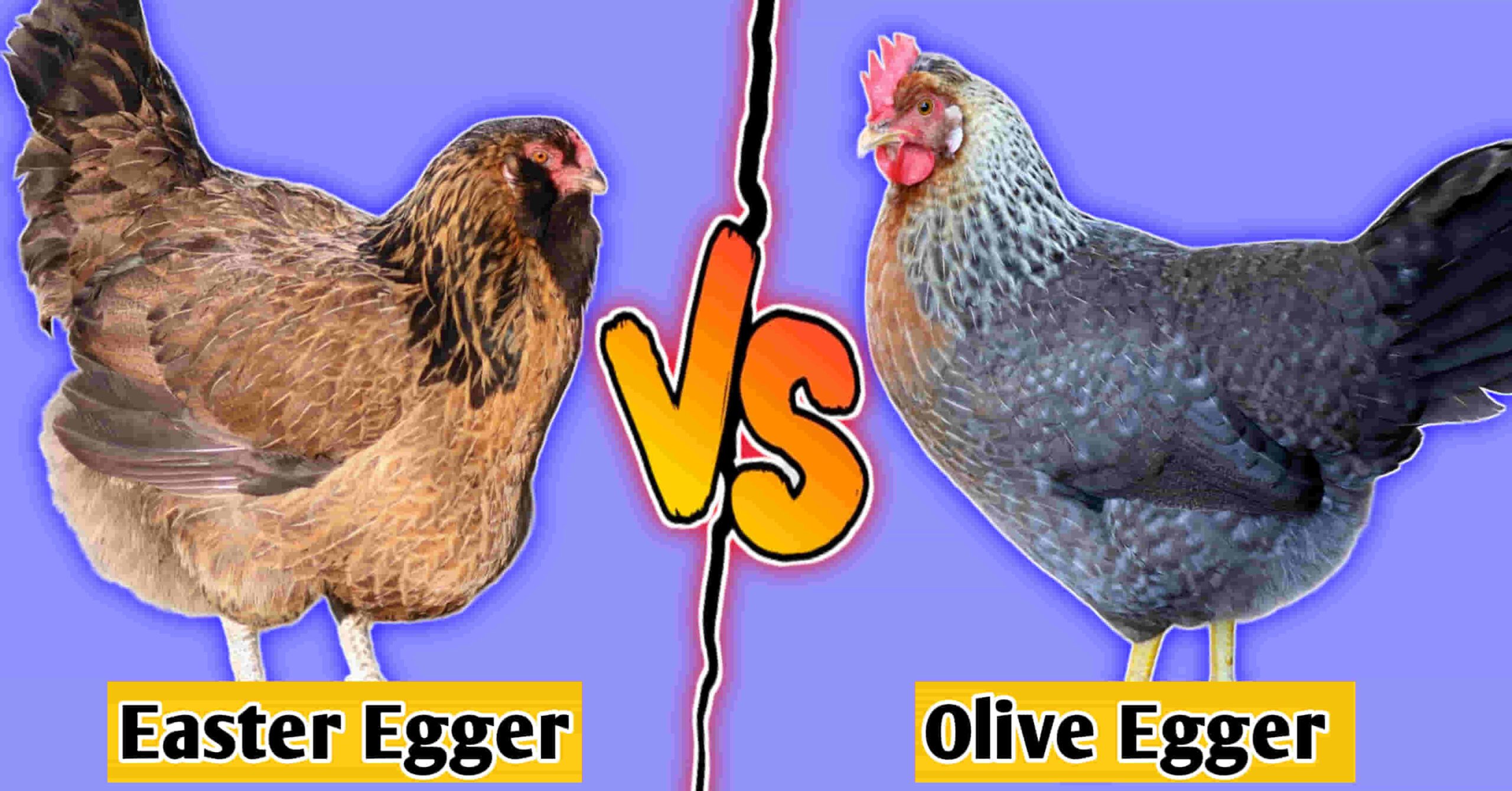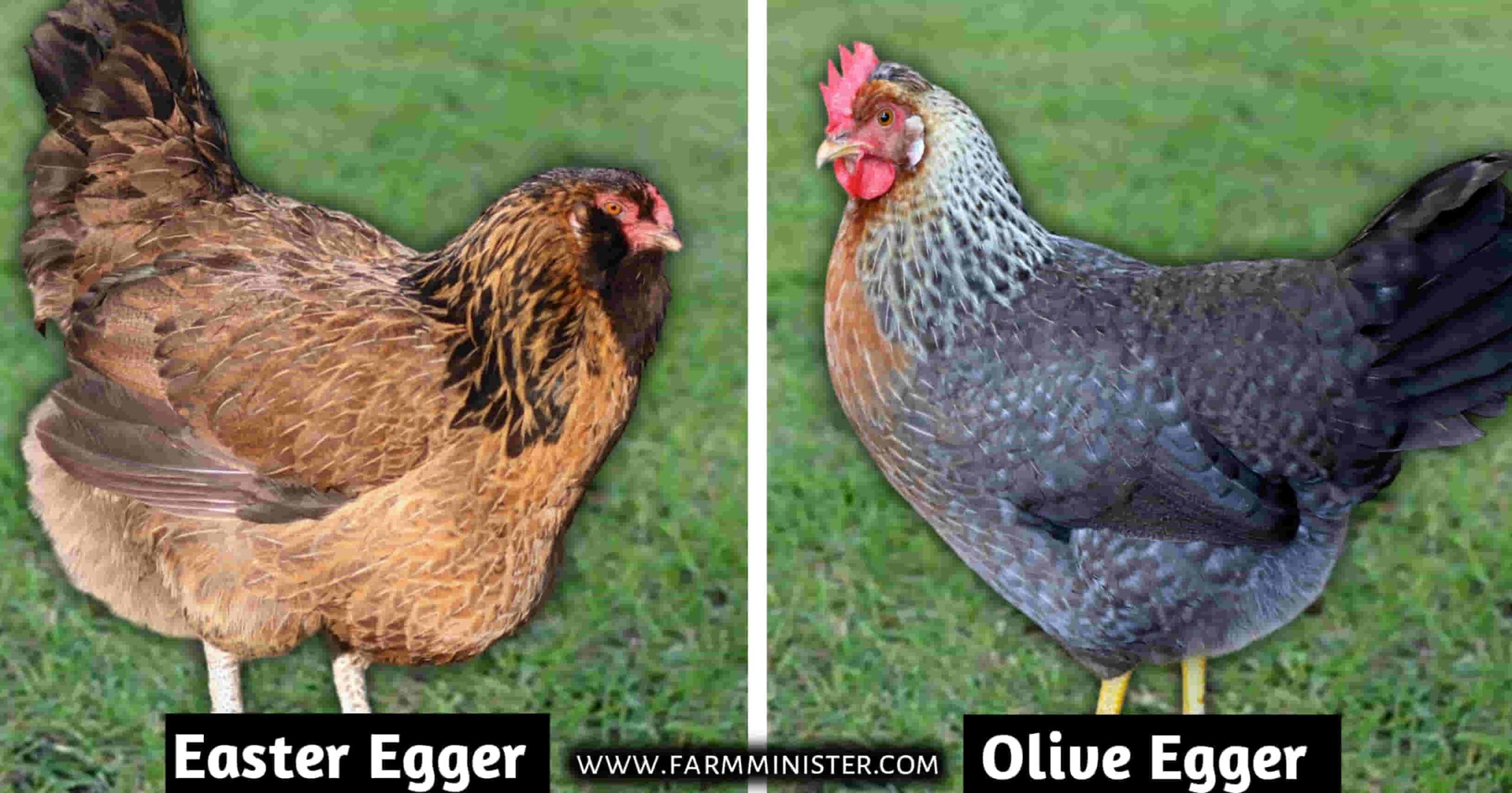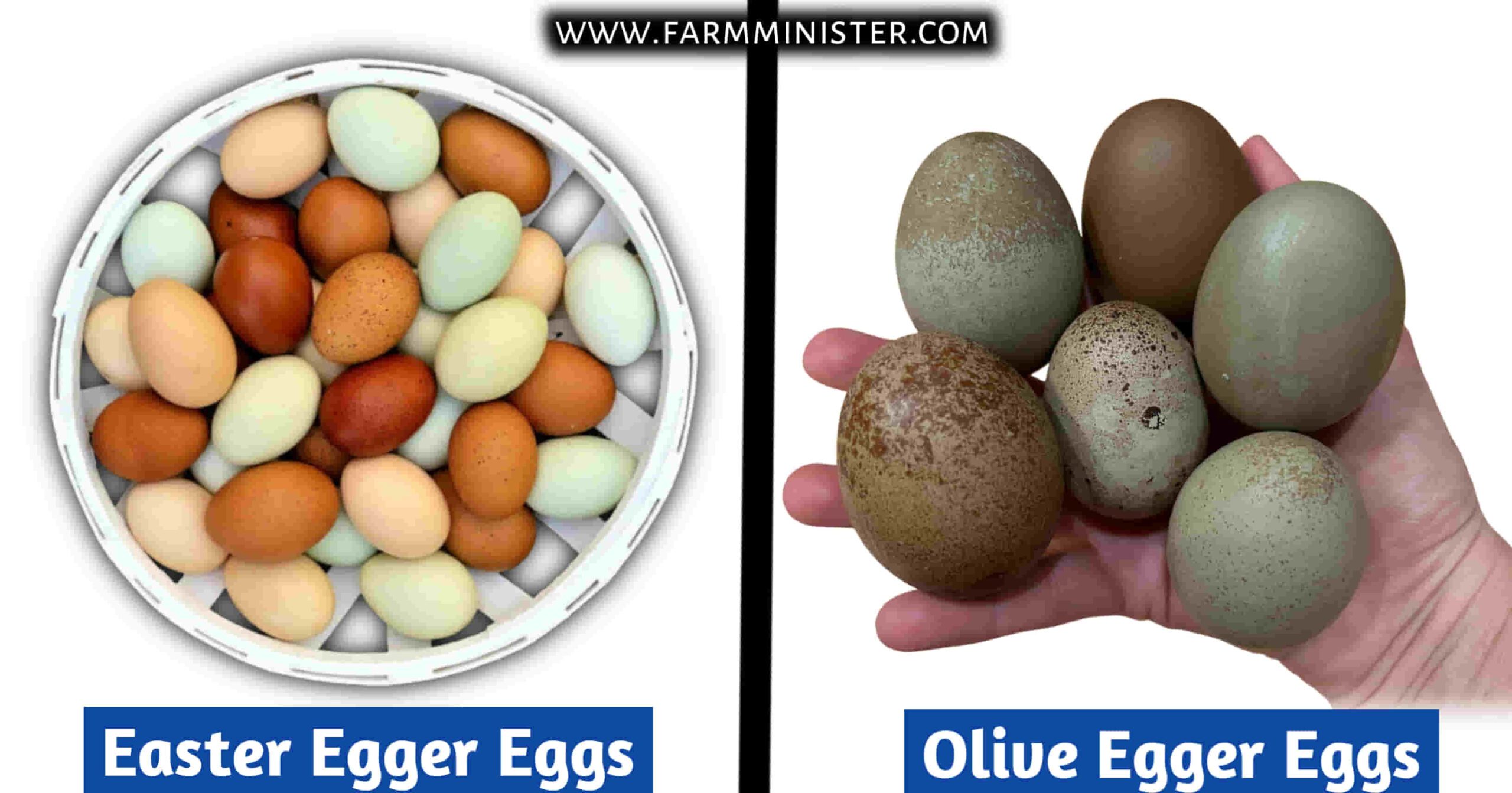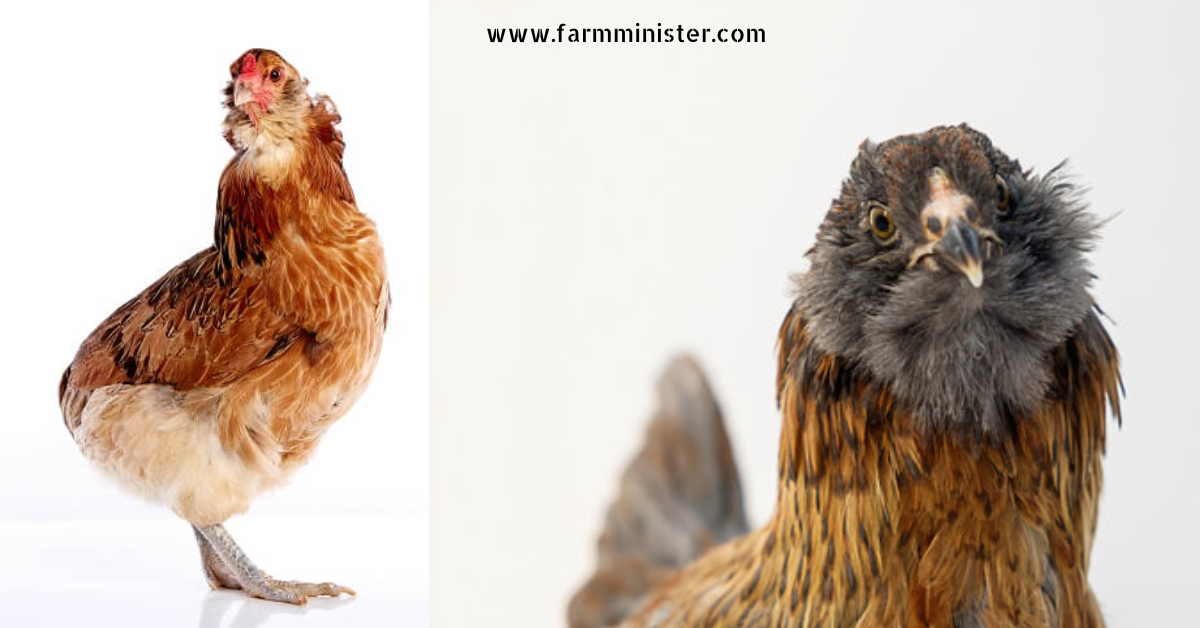If you’re looking to adding some variety of chickens into your backyard flock, then there are two popular choices are Easter Eggers and Olive Eggers. Let’s discuss in details about Easter Egger vs Olive Egger and compare their characteristics, appearance, egg production, lifespan etc.

Easter Egger vs Olive Egger Chicken
Easter Eggers and Olive Eggers are hybrid chickens, with their unique characteristics both are brings distinct qualities to backyard flocks. When it comes to comparing Easter Eggers and Olive Eggers chickens, there are some interesting differences to consider.
Here is a table comparing Easter Egger vs Olive Egger:
| Aspect | Easter Eggers | Olive Eggers |
|---|---|---|
| Breed Type | Hybrid breed | Hybrid breed |
| Recognized Breed | Not officially recognized as a standard breed | Not officially recognized as a standard breed |
| Temperament | Friendly, docile, and sociable | Friendly, curious, and sociable |
| Egg Color | Various colors including blue, green, brown, or cream | Olive-colored shells |
| Egg Laying | Good egg layers with a moderate to high production | Good egg layers with a moderate to high production |
| Feather Colors | Varied colors and patterns | Mix of dark and light feather colors |
| Feather Types | Single combs, pea combs, muffs, beards, tufted crests | Single combs, pea combs |
| Genetic Background | Mixed breed with blue egg-laying genetics | Marans (dark brown egg-layers) + blue egg-laying breed |
Are Easter Eggers and Olive Egger the same?
No, Easter Eggers and Olive Eggers are not the same. Easter Eggers are a type of hybrid chicken that can lay eggs of various colors, including blue, green, pink, and even cream. They are typically bred by crossing breeds that lay blue eggs.
Olive Eggers are a specific type of Easter Egger that lays olive green eggs. They are bred by crossing a blue egg-laying breed with a brown egg-laying breed that carries the gene for olive green eggs.
Here is a small video for you:
1) Origin
The origin of Easter Eggers and Olive Eggers is a bit murky, as they are not officially recognized breeds. However, it is believed that they originated in the United States in the early 1900s.
Although Easter Egger is not officially recognized as a standardized breed, are the result of intentional crossbreeding. Breeders combine various chicken breeds, such as Ameraucanas, Araucanas, Leghorns, and other blue egg-laying breeds, to create Easter Eggers.
As for Olive Eggers, they also have a interesting background. Like Easter Eggers, Olive Eggers are hybrid chickens, purposefully bred for their distinct characteristics. Breeders cross a dark brown egg-laying breed, often Marans, with a blue egg-laying breed, such as Ameraucana or Araucana.
2) Physical Characteristics
One of the notable characteristics of Easter Eggers is they are friendly and polite in nature, which makes them perfect for families with children. What sets Easter Eggers apart is their wide range of feather colors, patterns, and types, giving your flock a delightful variety and visual appeal.
As Olive egger is created by crossing a dark brown egg-laying breed, often Marans, with a blue egg-laying breed, such as Ameraucana or Araucana. Olive Eggers inherit traits from both parent breeds, resulting in a unique combination. These chickens are known for their friendly and curious disposition, adding liveliness and entertainment to your flock.
You May Also Like: Easter Egger Vs. Ameraucana

3) Temperament
When it comes to the temperament of Easter Egger and Olive Egger chickens, you can expect friendly and sociable companionship from both breeds.
Easter Eggers are known for their calm and docile nature. They tend to be gentle and approachable. Similarly, Olive Eggers also exhibit a friendly temperament. They are sociable birds that enjoy human interaction and can form bonds with their owners.
Ultimately, whether you choose Easter Eggers or Olive Eggers, you can expect to have delightful and sociable chickens that bring joy and companionship to your flock.
4) Feed Efficiency
When it comes to the feed efficiency of Easter Egger and Olive Egger chickens, both breeds generally exhibit good conversion rates, effectively turning their feed into body weight or egg production. Feed efficiency refers to how effectively chickens convert their feed into body weight or egg production.
It’s important to note that feed efficiency can depend on different factors, including the quality and composition of the feed, the health of the chickens, and the overall management and practices.

5) Hardiness and Health
Easter Eggers are known for their hardiness, meaning they have the ability to adapt well to different climates and environmental conditions. Similarly, Olive Eggers also tend to be hardy chickens, they also have ability to adapt in various environmental conditions.
When it comes to the hardiness and health of Easter Egger and Olive Egger chickens, both breeds generally exhibit favorable characteristics. In terms of health, both Easter Egger and Olive Egger chickens can maintain good well-being with proper care and attention.
6) Egg production
When it comes to egg production, both Easter Egger and Olive Egger chickens have their own impressive capabilities. Easter Egger Chickens are known for being good egg layers. On average, lay around 200 to 250 eggs per year.
Similarly, Olive Egger Chickens also possess excellent egg-laying abilities. As a hybrid breed, they are typically lay almost similar number of eggs as Easter Eggers, ranging from 200 to 250 eggs per year.
You May Also Like About: 5 Best Egg Laying Chicken Breeds

7) Egg Color
One of the most exciting aspects of Easter Eggers is the wide range of egg colors they produce. Their eggs can display shades of blue, green, and even various hues of brown or cream. The colorful eggs laid by Easter Eggers add a delightful surprise to your egg basket.
On the other hand, Olive Eggers lay eggs with olive-colored shells. The shade of olive can range from a soft light green to a rich dark olive-brown. Collecting these striking olive-colored eggs can be a fascinating experience for chicken keepers.
8) Lifespan
Easter Eggers, like most chickens, have an average lifespan of around 6 to 8 years. However, with proper care and management, some Easter Eggers can live beyond 8 years.
Similarly, Olive Egger chickens have an average lifespan of around 6 to 8 years, but proper care and management they can live more than that.
It’s important to note that these lifespan ranges are approximate and can vary among individual chickens. Some chickens may live shorter or longer, individual health issues, and the presence of predators or diseases can also impact the lifespan of chickens.

9) Broodiness
In general, Easter Eggers are not very likely to go broody. They have a mixed genetic background, which means they are less inclined to sit on and hatch their eggs. If you want chickens that focus more on laying eggs instead of hatching them, Easter Eggers are a good choice.
On the other hand, Olive Eggers may be more likely to go broody. Some Olive Eggers have inherited the broodiness trait from their parent breed, the Marans. Therefore, there is a possibility that some Olive Eggers may exhibit broodiness and show interest to hatch their eggs.
Conclusion
Easter Eggers and Olive Eggers both are the hybrid chickens with unique characteristics. Easter Eggers exhibit a wide range of appearances and different egg colors due to their mixed genetic background.
While, Olive Eggers have a more consistent appearance and lay eggs with olive-colored shells. Both breeds are popular among backyard chicken keepers for their friendly temperament and ability to lay unique and colorful eggs.
Ultimately, the choice between Easter Egger vs Olive Egger chickens depends on your specific preferences and goals. If you’re interested in variety of egg colors than, Easter Eggers might be the ideal choice. On the other hand, if you appreciate the allure of olive-colored eggs and the potential for broodiness than, Olive Eggers could be the breed for you.
FAQs
Q: Do Easter Egger chickens always lay blue or green eggs?
No, Easter Egger chickens do not always lay blue or green eggs. They can lay a variety of colors, including blue, green, olive, brown, pink, and even white.
Q: Are Easter Egger or Olive Egger chickens cold hardy?
Yes, Easter Egger and Olive Egger chickens are considered to be cold hardy.
Q: Do Easter Egger chickens go broody?
No, Easter Eggers are not very likely to go broody.
Q: Can I breed Easter Egger or Olive Egger chickens with other breeds?
Yes, you can breed Easter Egger or Olive Egger chickens with other breeds. However, it is important to note that the offspring of these crosses will not be true to breed.
Q: Do Olive Egger chickens go broody?
Yes, Olive Egger chickens can go broody.